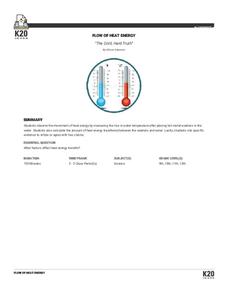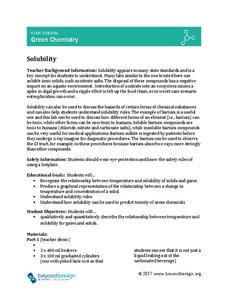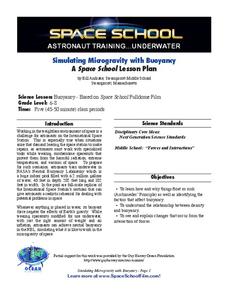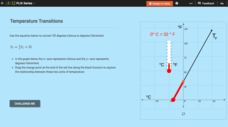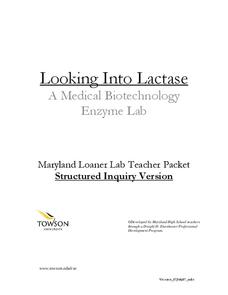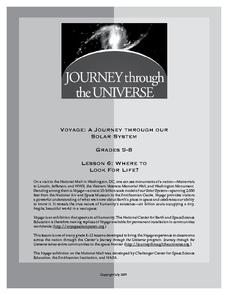K20 LEARN
The Cold, Hard Truth
Things are really getting heated in the lab! Science scholars scope out the facts about heat energy transfer using a simple lab from the K20 Center. Groups collaborate to observe temperature changes between hot metal and water, then use...
Beyond Benign
Solubility
Enhance your class' ability to understand solubility. Science scholars examine how temperature and concentration affect solubility using an interesting lab experiment. The introduction and procedure also discuss the relationship between...
Florida International University
Simulating Microgravity with Buoyancy
How do astronauts know how to live and work in a weightless environment? It doesn't come naturally! Junior physicists conduct experiments to examine the link between buoyancy and microgravity. Each activity illustrates a different aspect...
Nuffield Foundation
Enzyme-Catalysed Synthesis
Enzymes: not just for breaking chemicals apart. Young biologists perform an experiment on potatoes. They first remove starch from potato extract. They then add the resulting liquid to samples of glucose-1-phosphate, glucose, maltose, and...
CK-12 Foundation
Linear Equations: Temperature Transitions
Explore linear conversions using an engaging interactive lesson. Learners drag a point on a graph to discover the equivalent degrees in Fahrenheit and Celsius. Embedded questions highlight key features such as slope and the y-intercept.
CK-12 Foundation
Algebra Expressions with Fraction Bars: Temperature Conversion
Use a cool resource for a hot topic. Pupils learn how to convert Fahrenheit to Celsius, and vice versa. An interactive helps show how to perform the conversions.
Towson University
Looking Into Lactase: Structured Inquiry
Why is lactase important? Biology scholars explore enzyme function in a structured inquiry lab. The activity tasks lab groups with observing how temperature and pH affect enzyme activity, as well as determining which milk products...
Curated OER
Open Inquiry Using C. elegans
Ever wondered what motivates a roundworm? Introduce your biology class to C. elegans, a non-parasitic model organism that can help them understand behavioral stimuli. Paired pupils design an experiment to test the worm's reaction to...
University of California
Hot! Hot! Hot!
Calories are not tiny creatures that sew your clothes tighter every night, but what are they? A science instructional activity, presented at multiple levels, has learners experiment with heat, heat transfer, and graph the function over...
University of Minnesota
Makes Me Sweat
Never let them see you sweat ... unless you can't help it! Scholars design an experiment to determine the effects of stress on the body. They monitor sweat production under different conditions and relate the response to the function of...
Curated OER
Temperature
In this temperature worksheet, students conduct an experiment including water, measuring cups, a funnel, and more, to see how temperature affects ocean currents. Students read 5 directions and answer 7 questions.
Curated OER
temperature and the Scientific Method Lesson Plan
Sixth graders study heat, temperature, and heat transfer. Using probeware, the teacher demonstrates boiling points. Students participate in experiments and record the beginning and ending temperatures and mass of objects. After...
Curated OER
Thermal Energy
Explore thermal energy with your class with this introductory presentation. While there is information about heat, conduction, temperature and other topics, further information could be added to make it a richer experience.
National Wildlife Federation
Soil Decomposers
The class studies the soil food web that includes earthworms and conduct four experiments using the crawly critters. Individuals determine whether earthworms are sensitive to light, touch, temperature, and acid.
Cornell University
Energy Changes in Chemical Reactions
The heat of solution measures how much thermal energy a dissolving substance consumes or gives off. The experiment demonstrates both endothermic and exothermic reactions. Scholars dissolve several substances, measure the temperature...
NASA
The Big Climate Change Experiment Lesson 4: Weather Versus Climate
Decide whether to learn about weather. An illuminating lesson has scholars first watch video clips and discuss the difference between weather and climate. Using their newfound knowledge, they create analogies to illustrate this...
Science 4 Inquiry
Enzymes in Action
Enzymes play a role in almost every function in the human body. Scholars explore three variables related to the use of enzymes. They observe a catalase reaction, experiment with substrates, and examine reactions rates.
American Chemical Society
Chemical Reactions and Engineering Design
Construction leads to habitat loss and local wildlife suffers. Scholars must build a reptile egg incubation device that meets many constraints. Various experiments help them discover the chemical reaction needed to reach the proper...
Virginia Department of Education
The Rate of a Chemical Reaction
If your pupils think a catalyst is a list of their cats, then this might be the lesson for you! Young chemists study the effect of temperature, catalysts, concentration, and particle size on reaction rates during four different...
Towson University
Looking Into Lactase: Guided Inquiry
Milk does a body good ... unless, of course, someone is lactose intolerant. Pupils play the role of pharmaceutical scientists in a guided inquiry lab about lactase. Lab groups collaborate to learn more about lactose intolerance, how...
American Chemical Society
Can Gases Dissolve in Water?
Why does soda fizz when opened? Learners discuss the appearance of bubbles in soda bottles when opened. In groups, they design and complete an experiment comparing the amount of carbon dioxide dissolving in cold versus hot liquids.
Journey Through the Universe
Where to Look For Life?
Every year we discover new planets including more than 1,000 in 2016 alone. Will we ever find life on another planet? The lesson plan includes two activities to help scholars understand this concept. First, they analyze the temperature...
National Wildlife Federation
Get Your Techno On
Desert regions are hotter for multiple reasons; the lack of vegetation causes the sun's heat to go straight into the surface and the lack of moisture means none of the heat is being transferred into evaporation. This concept, and other...
American Chemical Society
Changing State: Evaporation
Why do experiments require a control? Guide scholars through designing an experiment to see what they can do to evaporate water faster with a lesson that stresses the importance of controlling all variables. The second activity allows...


